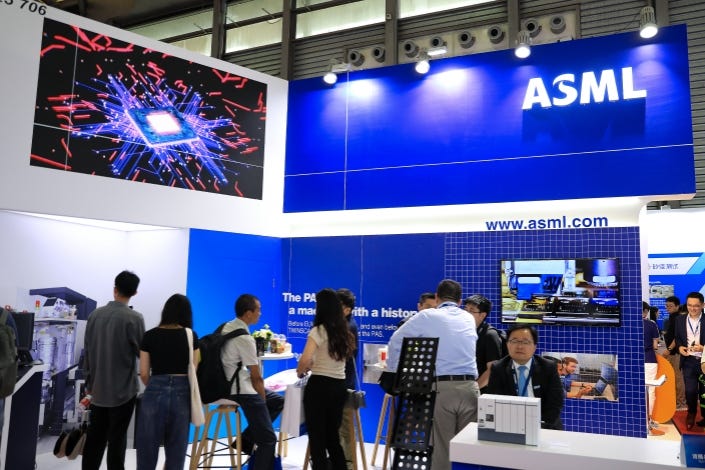Tech Insider: Huawei’s New Smartphone Fuels Chip Speculation, Baidu Chatbot Goes Public
How China’s chipmakers can level the playing field, ASML says it can keep shipping restricted chipmaking gear to China until year-end
Attendees visit ASML’s booth at an industry event in Shanghai on June 30. Photo: VCG
Welcome to Caixin’s Tech Insider, your twice-weekly wrap on the movers, shakers and deal-makers in China’s tech scene.
Huawei’s quiet smartphone debut fuels chip speculation
Huawei Technologies Co. Ltd. discreetly launched a new flagship smartphone on Tuesday, said to be powered by a self-developed chip that can rival the speed of 5G handsets, as the tech giant tries to shrug off the impact of U.S. sanctions and capitalize on robust quarterly domestic sales growth.
The company began offering the Mate 60 Pro at 6,999 yuan ($962) without prior advertising. The company also gave no detail about what kind of system-on-a-chip (SoC) the smartphone uses and whether the handset is compatible with 5G wireless networks.
Some buyers also uploaded results of software tests that indicate the Mate 60 Pro is using Huawei’s Kirin 9000s SoC, though no information about the chip is available on the website of its chip design subsidiary HiSilicon Technologies Co. Ltd. HiSilicon’s market share dwindled to nothing last year due largely to a U.S. campaign to prevent advanced technologies including 5G chips from falling into the hands of its parent.
Analysis: How China’s chipmakers can level the playing field
China’s chip industry is being forced to evolve rapidly to meet the vast needs of the country’s cutting-edge tech developers that are now largely cut off from international supply chains. But Chinese chipmakers are going up against global leaders, namely Nvidia Corp.
In a span of two decades, Nvidia transformed from a fledgling startup to a trillion-dollar tech titan. Its graphics processing units (GPUs) are now essential arsenal in the AI arms race.
With global AI companies’ prowess now seemingly measured by their Nvidia GPU count, and as Chinese tech giants like Baidu Inc., ByteDance Ltd., Alibaba Group Holding Ltd., and Tencent Holdings Ltd. reportedly placing orders worth billions of dollars, one is left wondering: How can the Chinese chip industry level the playing field, or even edge ahead?
Baidu opens its AI-powered chatbot to the public
Baidu Inc. has made its artificial intelligence (AI) ChatGPT challenger, ERNIE Bot, fully accessible to the public, the Chinese tech giant announced Thursday.
Users can download ERNIE Bot on app stores or on its official website, the firm said.
Baidu became the first among Chinese tech firms to challenge OpenAI’s ChatGPT when it debuted ERNIE Bot in March. Seven government agencies, including the Cyberspace Administration of China, subsequently released regulations to oversee the generative AI industry that took effect on Aug. 15.
Based on the rules, providers can only launch their generative AI products to the market after regulators approve both their security review and algorithm registration, Raymond Wang, head of the compliance department at Shihui Partners, told Caixin at the time.
ASML says it can keep shipping restricted chipmaking gear to China until year-end
ASML Holding NV said it has licenses to ship restricted chipmaking machines to China until the end of the year, even as export curbs kick in from September.
Europe’s most valuable tech company doesn’t expect to get export licenses to ship three advanced immersion deep ultraviolet lithography, or DUV, models to China from January, an ASML spokesperson said on Thursday.
ASML has been hurt by the U.S. effort to curb exports of cutting-edge technology to China, the Veldhoven-based company’s third-biggest market. U.S. President Joe Biden’s administration had urged the Dutch government to prevent ASML from shipping some so-called immersion DUV lithography machines, its second-most capable machinery, to China without a license.
Nio’s quarterly loss widens on falling auto deliveries
Chinese electric-car maker Nio Inc. reported a wider-than-estimated loss in the second quarter as vehicle deliveries came in at the low end of the company’s target.
The automaker posted a net loss of 6.06 billion yuan ($831 million) for the three months through June 30, it said Tuesday. Revenue dropped 14.8% as quarterly deliveries fell 6% to 23,520 vehicles, at the bottom of the company’s forecast.
While senior executives earlier this year claimed to be “very confident” of doubling sales to 250,000 vehicles in 2023, Nio managed to ship only 54,561 cars in the first half — just over 20% of its annual goal. It also missed its annual target last year and was forced to delay investments, postpone research plans, and be more cautious in its overseas expansion.
Pinduoduo co-founder Colin Huang’s fortune grows by $4.3 billion
Colin Huang’s wealth surged by $4.3 billion Tuesday as shares of PDD Holdings Inc., the Chinese company he founded behind the e-commerce platform Pinduoduo, rose in New York trading.
The Shanghai-based company reported better-than-projected revenue of 52.3 billion yuan in the quarter ended June 30, beating analysts’ average estimates. Its U.S.-traded shares climbed 15% Tuesday to close at their highest level since March.
Huang, 43, who stepped down as CEO three years ago, derives most of his wealth from his stake in PDD. Tuesday’s jump in net worth was Huang’s second-largest one-day percentage gain this year and pushes his total fortune to $32.8 billion, according to the Bloomberg Billionaires Index.




